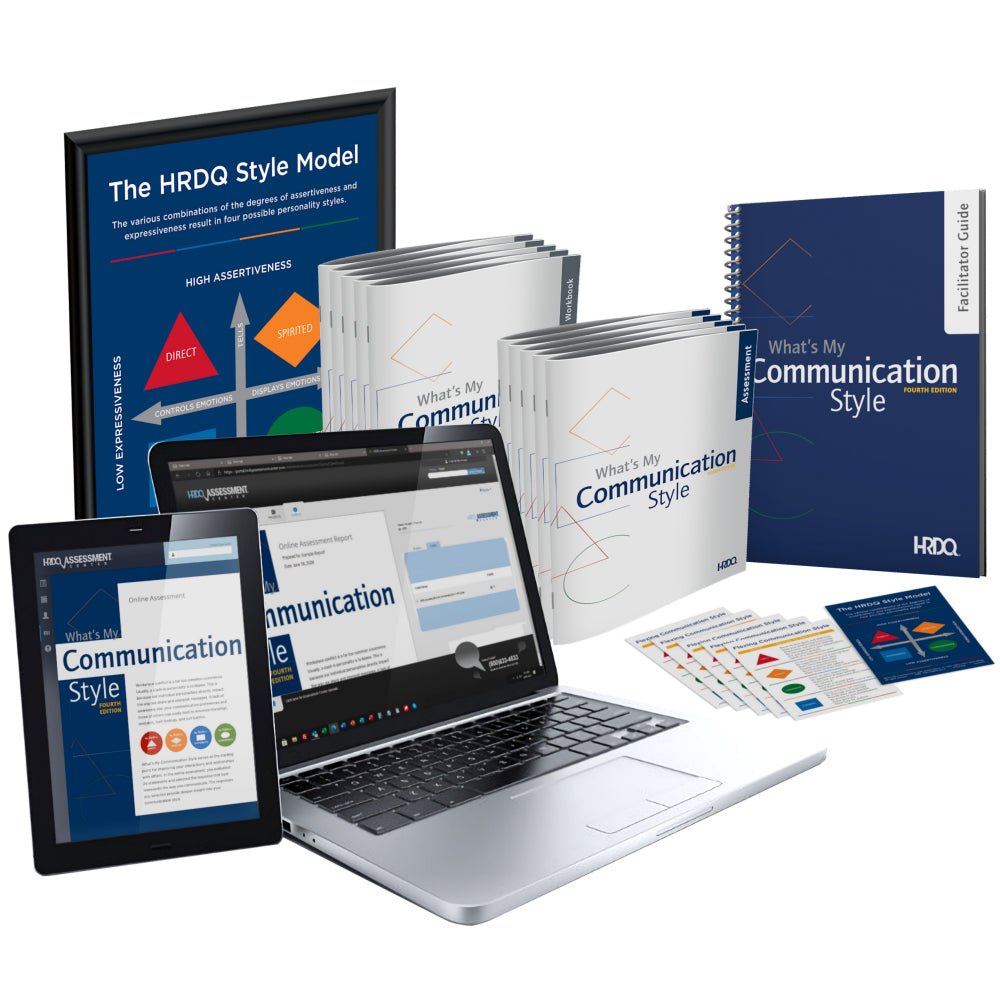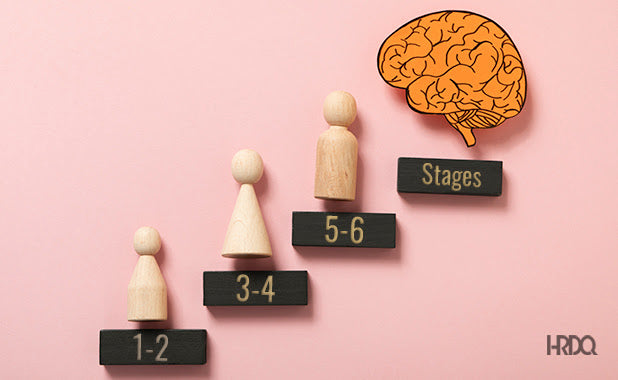Share
The 6 Stages of Moral Development: A Comprehensive Guide
Bradford R. GlaserHave you ever considered the reasons behind your choices? Whether you're picking your breakfast or making big-figure decisions, it all comes down to a simple yet impactful thing – your moral code. It's this surprise guideline, rooted deep in your early days, that shapes the way you make your decisions.
This post was built to shine a light on how our ethics intertwine with our daily choices. Let's jump in, shall we?

- Enhances communication skills
- Offers flexible training tools
- Improves team dynamics
Table of Contents
What Is Kohlberg's Theory of Moral Development?
Picture this: you start caring about the rules, primarily because you're hoping for that super-useful star or to dodge a time-out. That's the idea behind the first step we all take in figuring out right from wrong, as explained by Lawrence Kohlberg. He built upon Jean Piaget's work – the fellow who broke down how our brains get more complex as we grow up.
Kohlberg said we move through different levels when making ethical choices. Initially, it's in "What's in it for me?" or "What trouble will I avoid?" Kind of like when I was a kid, and I only cleaned my room to avoid my mom's scolding.
As we grow, we start to think, "What do other people expect?" We're fairly in tune with what the majority thinks is normal or right.
The big goal, the cherry on top, is when we base our calls on principles that stand the test of time – think fairness and respecting others. Not everyone gets there, and honestly, Kohlberg's theory has been criticized because it seems super focused on justice and might not take all cultural perspectives into account.
But still, it's been widely influential in how teachers and psychologists know our moral compasses.

So why does this matter, you ask? Kohlberg's road map helps us figure out why we don't all agree on what's right or wrong. It's in the mix of our life stories and who we bump into along the way.
And thinking about it, it's a great reminder that we should all keep an open mind and learn from each other. In the grand scheme of things, we're all fine-tuning our moral code.
Let's talk about each of these levels and what they mean.
#1-2: The Preconventional Level
I know what you're thinking – being a kid is fun, right? Not always! From the get-go, children find themselves on a profound path leading them to moral maturity. The quest starts with them recognizing simple rules: do this and get a reward; do that and face a penalty.
It's childhood's first lesson – actions have consequences. Parents and teachers hammer this point home until it sinks in. But simplicity has its limits.
We enter the growth phase, where life lessons start to have more layers. At this stage, kids learn that more than one perspective exists! Shocking, right? Take exchanging toys – both kids end up happy with their new toys. This phase, known as "Individualism and Exchange," teaches children that what works for one may not work for another; life isn't black and white.

Sounds pretty complicated, right? Well, these two stages together are what's known as the "Pre-Conventional level" of moral development. It may not be a high-stakes poker game, but it lays down the cards for understanding morality.
And then comes the big jump: the child graduates to the "Conventional level." The way they look at morality has changed. I'm not talking about dodging penalties or reaping the rewards anymore; it's about being a part of something larger – society. They learn to stick to norms because it's about creating a harmonious community.
#3-4: The Conventional Level
Think back to being a kid, learning about how the world works. There's a stage in our growth, Kohlberg's Stage 3, that we all pass through. You know, the one where "good" kids and "nice" people are the order of the day? It's about following rules, quite a pivot from Stage 2, where it's about approval.
Here's where we begin to grasp that there's a grand set of guidelines to abide by.

Fast forward to the next phase, Stage 4. This is where things get really interesting. Suddenly, you see the world differently. Rather than a place of hard and fast rules, you see a complex combination of views, rights, and compromises. These once stuffy and strict rules now appear as social agreements meant to serve us all. Something shifts inside you, and if a rule seems unfair, you question it or challenge it. This sort of change gears us towards a fair, democratic society.
Here's something you won't believe. While in these stages, our values are shaped majorly by the world around us – the laws, the norms, and what society expects from us. Keep in mind that as we move beyond our personal perspectives to think about the wider community, these external forces still guide us. This isn't the end of the road. There are more stages to come that will bring about an inner transformation.
#5-6: The Post-Conventional Level
Imagine, if you will, you're going about your regular day when, out of nowhere, you're faced with a tough ethical choice. You must pick between ideas that are surface-level options but look deeper, touching upon your inner values and ethos. Let's take a peek into our moral decision-making: Phases 5 and 6, which are more approachable names for the Post-Conventional Level. Here, ethics aren't tied to what society thinks is right or wrong.
Phase 5, which you might hear referred to as the Social Contract stage, sees laws as pliable guidelines. Some believe that laws need to evolve with us, taking into account our changing perspectives while still catering to everyone's health.
Here's another layer to the cake. Phase 6, better known as the Universal Ethical Principle stage, boosts things a bit more. It separates personal beliefs and values from the influences of society. Seeing beyond borders and understanding the consequences of our actions on a widespread scale is an eye-opener.
Think about this. Your brain is always your silent partner in processing these ethical issues. Did you know that the ventral striatum (a little corner of our brain) lights up when we're deep into an ethical dilemma? That suggests that our sense of morality is socially conditioned and lies somewhere in our gray cells.

Reaching these moral heights is a process. It takes time, and factors like upbringing, education, and life experiences play a big part. For some, handling delicate ethical questions feels like climbing Mount Everest, especially when rigid societal norms and unquestioning obedience ingrained by some educational systems sit like huge boulders on our paths.
Theories are the foundation of understanding these processes, but that's not to say they're perfect. To give you an example, Carol Gilligan showed that Kohlberg's model, In its very nature, leans towards a male perspective, leaving little room for other views. Only about 10-15% of people manage to scale these post-conventional levels, and very few make it to the top.
Morally, growing is a road less traveled but majorly rewarding. It's like a two-way street; as we develop ethically at a personal level, we also improve our collective consciousness. It's a challenging climb, sure. But the result – the new understanding and personal growth, makes it all worth it. Talk about a win-win!
Remember, ethical dilemmas may challenge you, but they also offer an opportunity to better ourselves and our world.
How Moral Development Grows a Brand
Imagine if the companies we worked for led with strong values and genuine care. How would that turn your day-to-day work life? I'm shining a light on the simple yet powerful idea of integrating the "good stuff" – these core values and ethics that commonly take a back seat in our bustling work environments. It's astonishing how paying attention to these ignored principles can amp up our productivity, our company's reputation, and our overall success.
Let's steer away from wanting too complex language like Employee-Based Brand Equity (EBBE) and make it down-to-earth. Think about it: building a business that's as trustworthy and sturdy as an oak tree, powered by respect, a spirited team, and unwavering principles. Can you imagine the wave a very uplifting work culture could create?
You might not expect this, but taking ethics off the shelf and blending them into your brand's identity can change your people in the best ways! It's majorly underestimated. Once you get it, you see I'm talking about a nice-to-have; it's really important. Ethical brands send out a call for togetherness, encouraging a sense of loyalty from everyone who touches the brand. We're talking about growth built on collective effort, where we all pitch in to create and shape the brand's progress.

Turn your gaze to creating morals within your brand, and you'll be creating a company and cultivating stronger communities. When shared values lead the way, everything improves – our workplaces become more lovely, employee morale soars and our customers enjoy their experiences more.
However, keep in mind that acting ethically is not a quick path to business success. Companies praised for solid ethics effortlessly win people over, securing a kind of loyalty money can't buy. These businesses are seen as doing right by society – it's a double win. And remember, moral responsibility goes way past a "nice touch"; it's downright indispensable! By zeroing in on ethics, we inject life into our teams, cement our brand's identity, form reliable communities, and wave the flag for doing business correctly.
So, incorporating ethics into your brand is far more than a lofty idea; it's a deeply strategic technique – practical, actionable, and game-changing.
Other Benefits of Moral Development for Businesses
If you've ever found running a business a bit like handling a maze, don't worry; you're far from alone. Reaching the cheese at the end may seem impossible or useless. But fear not; that's where a good dose of ethical behavior comes into play. It can act as the guide within the tunnel, leading to a workplace that's productive, cooperative, and essentially free from legal mishaps.
Thinking of this, it's crucial that your business choices reflect the set ethical principles. Walking this path brightens your process to success and will make sure your actions keep up with your business's heartbeat. When you establish high ethical standards, you might notice other businesses trying to follow your playbook more than you think. So, I'm talking about individual achievement and sparking a change in the broader business scene.
How about you take another look at your existing operating procedures with a fresh set of eyes, keeping ethical norms at the forefront of your mind? Sure, being truthful is a no-brainer. But the crucial part? Making it part and parcel of your daily grind. Early adoption of ethics can end up being a masterstroke in the grand scheme of things.

Initiating ethics into your business strategy might feel overwhelming; you wouldn't believe it, but that's normal. Rather than viewing it as a mountain to climb, see it as an opportunity to fine-tune and grow.
Scheduled checkpoints of your ethical standards will keep them in sync with your business goals, ensuring you stay on course.
Finding your base values could be a great path forward to success and a shield against a volatile market. You'll find businesses that have successfully surfed these choppy waters with a firm, ethical surfboard, which is worth looking into as a case study. The old saying, "Prevention is better than cure," hits home here.
Ready to Improve Your Team Dynamics?
The whole 'Kohlberg's Theory of Moral Development' thing can sound pretty scary, right? It seems hidden behind its posh title and complex technical language. It's not as complex as you think! It's just about practical tips that help to boost teamwork and level up your communication game. These valuable tools are taught in this very user-friendly resource called What's My Communication Style.

I know what you're thinking; this theory seems like it's only for academics, right? That's not the case! It's a guide to help you navigate life's complicated web. Imagine weaving such ways of thinking into your daily life. That could change how you interact with people and boost the quality of your communication.
Interestingly, adding empathy – that cornerstone of all great relationships – into a theoretical framework is a pretty groundbreaking move. Following these principles could start off building a society that understands each other better. So, getting your head around and applying Kohlberg's guidance could revolutionize your interaction with the world.
Rooting yourself in Kohlberg's principles might spark both personal and societal growth. Believe it or not, even small changes in how you see or behave can cause a significant shift. Why not be that change? Recognizing and using this nugget of wisdom could make a bigger splash than you think. It's pretty impressive, isn't it?

- Enhances communication skills
- Offers flexible training tools
- Improves team dynamics





















































